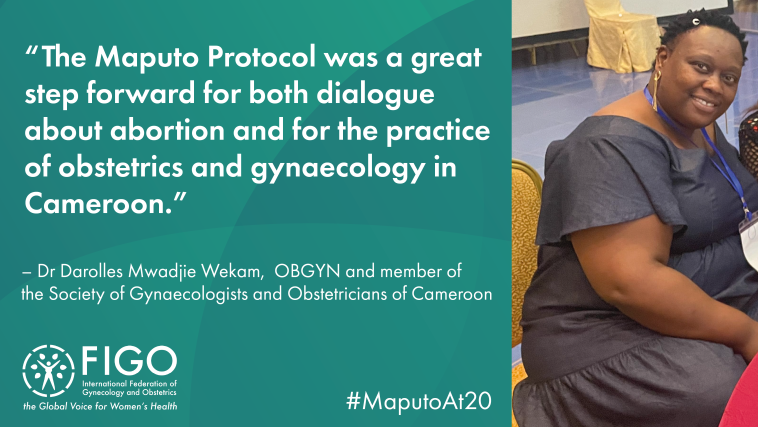Dr Darolles Mwadjie Wekam on the importance of the Maputo Protocol for safe abortion care in Cameroon
On 11 July 2023, FIGO is celebrating the 20th anniversary of the Maputo Protocol by sharing reflections from across Africa on how the Maputo Protocol has impacted the practice of obstetrics and gynaecology. Dr Darolles Mwadjie Wekam, an obstetrician-gynaecologist, highlights the significance of the protocol in opening the dialogue on safe abortion care in Cameroon.

Dr Darolles Mwadjie Wekam is an obstetrician-gynaecologist (OBGYN) with a passion for preventive medicine, communication and teaching, and a particular interest in infertility and breast cancer in Africa. She is Head of the Gynaecology-Obstetrics Department at the Gynaecology-Obstetrics and Paediatrics Hospital in Douala, Cameroon. For a number of years now, she has advocated for the wellbeing and rights of girls and women through the Advocacy for Comprehensive Abortion Care within the Société Gynécologues-Obstétriciens du Cameroun (SOGOC).
What are the main achievements of the Maputo Protocol for your work as an OBGYN?
The Maputo Protocol was a great step forward in terms of both dialogue and the practice of obstetrics and gynaecology in Cameroon. We used to have a law on abortion, but its indications were very limited. The fact that we ratified the Maputo Protocol enabled us to resume the dialogue on abortion. In other words, it allowed us to open up the debate in Cameroon through the Maputo agreements and to talk about the indications for access to safe abortion care. In our practice as gynaecologists, this has enabled us to practice within the legal framework for therapeutic termination of pregnancy.
What are the main challenges in implementing the Maputo Protocol in Cameroon?
The key challenge is really to integrate the various elements of the Maputo Protocol into Cameroonian law, so they are clearly set out in cases of access to safe abortion care, and we don't have to cite the ratification of the Maputo agreements every time. So it's an institutional and legislative challenge. We're currently advocating for this, but to do so we need the various opinion leaders and legislative decision-makers to support us in the process.
How do you think these challenges can be met?
These challenges can indeed be met, but it's a long-term, ongoing process. You can't introduce a law overnight, so you have to keep up with the advocacy work.
As far as implementation in Cameroon is concerned, SOGOC, in partnership with FIGO, has an advocacy programme for safe abortions. As part of our Advocacy for Comprehensive Abortion Care (ACAC) programme, the first point of advocacy concerns the implementation of the Maputo agreements, which are ratified but are not clearly set out in Cameroonian law.
What role can health professionals play in advocating for the full implementation of the Maputo Protocol?
Gynaecologists are the first observers of the effect of not having the Maputo protocol enshrined in law. We're on the front line, so it's up to us to make people aware of the problem of the lack of implementation of the Maputo agreements and the seriousness of the situation. The decision-makers are not on the ground like us. Once we have made the exact situation known, we have to keep pushing through our voices and actions to bring about change. So we gynaecologists are at the beginning of the process, but we are also key actors in the process.
How has the Maputo Protocol influenced the training and education of health professionals in the field of obstetrics and gynaecology?
With SOGOC, we met with all the medical faculties in Cameroon and trained all the final-year students on abortion. We trained them on the legal framework with the application of the Maputo protocol and on the practical and technical aspects of managing abortions.
What would you like to see in the next protocol, if it were to be extended?
If the protocol is to be extended, I think what we need above all is support for the various institutions. Protocols are great, but their implementation poses many problems because of a lack of support, especially in terms of resources. We need human resources, we need people who are really trained in applying these protocols, as well as logistical resources and financial resources for implementation.